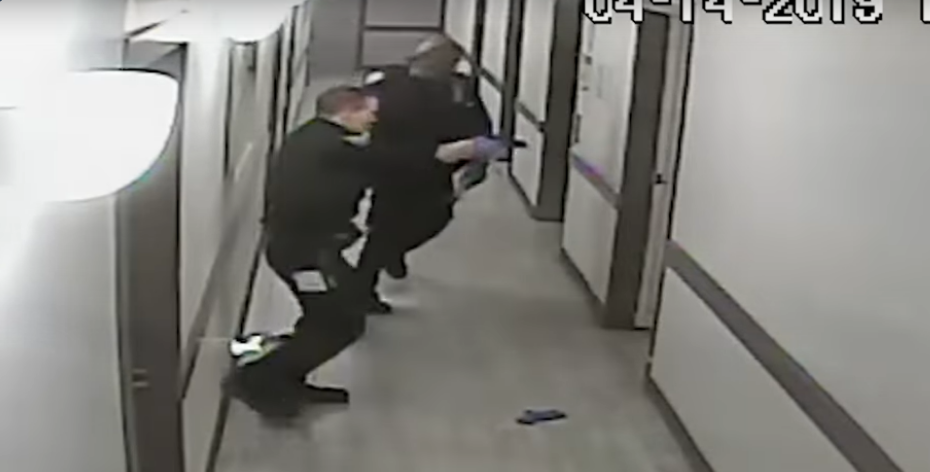Edward Pinkney may have been the first preacher ever imprisoned in the U.S. for writing an article. However, Rev. Pinkney served only a fraction of that time in prison.
[National: Commentary]
Arrogance, unaccountability and far-reaching control have been attributed to many judges in America in recent years.
Ballot initiatives in North Dakota and elsewhere have taken place to try and rein in judges who don’t allow defendants to bring forth crucial evidence and witnesses to help their case, and who micromanage and manipulate juries which are supposed to have considerably more power under the original understanding of the American system.
Well, in southwest Michigan such apparent arrogance almost railroaded a 60-year-old preacher for up to 10 years for writing a newspaper article about a judge.
Noted attorney Hugh “Buck” Davis said last year that the Rev. Edward Pinkney may have been the first preacher ever imprisoned in the U.S. for writing an article.
However, Rev. Pinkney served only a fraction of that time in prison. An appellate court in Michigan last month approved his appeal, saying his constitutional rights were trampled upon and that tossing him in the dungeon for writing an article had nothing to do with rehabilitating him or protecting the public.
Thus, Pinkney stood his ground and gave “the system” the kind of nonviolent “retaliation” that is sorely lacking these days. You don’t see this sort of grace under pressure often enough. Perhaps it will set a precedent for some serious judicial reform.
Pinkney, having spent the last half of 2008 being shuffled from the Berrien County jail — and then in and out of no less than seven prisons in Michigan to destabilize him and keep him away from his supporters and family — had 21 more days of house arrest to endure as of Aug. 13, 2009. This Black Baptist minister saw his media gag order lifted early this year and is patiently awaiting the end of house arrest, which will clear the way for filing a civil lawsuit against the government of Berrien County for what he generally describes as “malicious prosecution.”
His “naughty” article that appeared in the People’s Tribune, described as a populist Chicago publication, took Berrien County Judge Alfred Butzbaugh to task, saying that God’s wrath would be upon him for the way he handled Pinkney’s long, dramatic case. The judge found the article threatening. Yet, the First Amendment prevailed in the end.
“Normally, the tether would have been removed on July 14,” Pinkney told this writer, of the house arrest, referring to when the panel of three appellate judges, convening in Grand Rapids, voted 3-0 to reverse his probation violation for writing the article that landed him in prison.
Meanwhile, Pinkney, even though the tether should have been removed by now, remains at relative ease, and is determined not to allow the “powers-that-be” in this ironclad-GOP-controlled county to push him over the
edge.
This case has had several episodes. And much has been said and written about Pinkney’s overall experience – from when he was first arrested on April 18, 2005 until now, more than four years later.
The simple version of events is that Pinkney was convicted in 2007 of allegedly paying people $5 to vote in a recall election in the southwestern Michigan city of Benton Harbor and was sentenced to probation.
This 2005 election that Pinkney helped put on the ballot successfully led to the recall, by 54 votes, of powerful City Commissioner Glen Yarbrough, whose removal from office was sought because he supported the controversial Harbor
Shores golf course/housing development along Lake Michigan that involves using more than 20 acres of a longtime city park for a new Jack Nicklaus Signature Golf Course and related upper-scale housing.
Jean Klock Park was bequeathed to the city as a permanent gift (in memory of a deceased child), and those who did not want part of the park used for the golf course stressed this to the authorities and developers, but to no avail.
Thus, a smaller but spruced-up park debuted this summer, and the adjacent posh golf course is coming along, as is the housing development. But Pinkney and his supporters see the public-but-expensive course and the rest of it mainly as “rich man’s recreation” in an overall community that needs manufacturing jobs so a middle class can take root where it once thrived and the tax base can be restored to fund the schools and sufficient public services and programs.
As for the recall election, Pinkney insists that the county and others manipulated witnesses to falsely testify against him. The government machine, as he sees it, had grown weary of him due to his highly visible court-watching activism he had pursued since 2000, keeping tabs on what he says are abnormally high imprisonment rates in predominantly Black Benton Harbor.
Upon being recalled, Yarbrough marched off to the Berrien County clerk’s office to complain and eventually his own recall was overturned. He and others alleged that Pinkney had paid people to vote against him.
Pinkney, who also was accused of mishandling absentee ballots, believes Yarbrough paid certain people money to get them to say that Pinkney paid them to vote for Yarbrough’s recall.
Pinkney was a prominent figure, who tried to be a voice of reason, in the 2003 uprising of city residents who were angry over the death of a young Black man who some alleged died because overly-aggressive police forced his motorcycle off the road. The summer uprising led to the burning of several houses and city-level martial law was apparent. Armored personnel carriers and police, armed military-style, prowled the streets.
The golf course-housing development, that can only produce seasonal service jobs and some non-permanent construction work, has the backing of a private Harbor Shores development group linked to the Benton Harbor-based appliance giant, the Whirlpool Corp., along with the city government’s apparent blessing, and the concurrence of the county and state.
U.S. Congressman Fred Upton is part of the mix, as he is a Whirlpool heir and backer of the development.
The area’s political-economic “machine,” according to Pinkney and his supporters, aids and abets the “gentrification” of Benton Harbor, wherein a once a-prosperous city has been hurt by corporate favoritism and certain government welfare and trade policies over the decades, pushing poor Blacks, some poor whites and others to the margins – a kind of upper-class dominance that seems to promise genuine improvements but in the end establishes a microcosm of today’s world, where the plutocratic minority–the rich few of whatever background– continue to favor free trade (such as NAFTA, that Rep. Upton approved) and pursue other policies and projects that might make some marginal improvements but in the end are little more than fool’s gold.
As commentator Paul Craig Roberts often has stated, America has had its fill of service and hospitality jobs and needs to produce durable goods via manufacturing so the U.S. trade deficit can be reversed into a surplus and cities like Benton Harbor that once thrived can thrive again, from the bottom up, not from the top down.
From here, Pinkney’s pending civil lawsuit could produce some interesting revelations. Stay tuned.
(bhbanco.org)
Please feel free to post your articles directly online or submit them to [email protected]
“Speaking Truth To Empower.”











